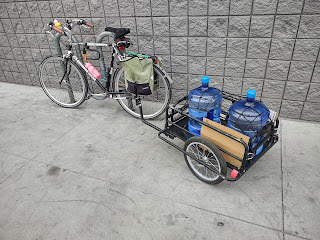The Tragedy of Saturday Service
The RTC will be operating using its reduced, Saturday service schedule, starting last Monday and continuing until... who knows? This means that, while users in the core transit-served areas of the Valley will notice only mild reductions in frequency, riders on routes on the edges of the service area will see some pretty drastic cuts. Take, for example, the 121 Durango/Buffalo, running through the western suburbs: the weekday schedule has it as a standard half-hourly route, but on Saturdays it only runs hourly. If that's the bus you rely on, it's a significant cut, and it'll mean that it's that much harder for me to get to one of my doctors, just as an example.
Why would the agency do this? Well, the same reason everything sucks in the world today, and the same reason I haven't posted in over two years: the coronavirus. Logistics companies are desperately trying to move all the stuff we've been ordering while we've been in lockdown, through a pandemic-stricken system full of random delays and shortages, and one effect of that is that, if you've got experience driving a large vehicle, you can easily find high wages in the trucking industry right now, much higher than most public transit operators pay. Combine that with high rates of absenteeism due to the disease itself, and transit agencies from Los Angeles to St. Louis, from New York to D.C. have been scrambling to put enough operators on their buses and trains. Riders prior to this week probably noticed at least one or two buses during their daily commute that just... didn't show up. (I had it happen to me a few times, most egregiously on the 106, when the next bus wouldn't show for another hour!) Moving to a Saturday schedule means fewer buses, which means fewer drivers are required to run a shift, which should mean that all of the buses that exist in the Transit Guide will also actually roll down the streets.
Reliability is absolutely crucial in running public transportation. If you can't count on your bus getting to work on time, it means you need to take an earlier one, just in case, and that can easily add hours to every work day. It's obviously unacceptable to have runs simply disappear from the timetable without notice or comment. But it's also a tragedy that bus frequencies are being slashed, right at a time when we need to be expanding our transit network! The climate emergency remains before us, our roads are more dangerous than they've been in decades, and our cities are still being distorted to meet the needs of ever more cars, especially here in the southwest. Reducing public transportation in this moment is running away from fixing half a dozen social and environmental problems, and it's heartbreaking that this choice is being made, not only here in Las Vegas but across the nation.
What's even more heartbreaking, though, is the difficulty of solving this problem. Fundamentally, attracting workers to transit agencies is a matter of offering them a better wage and benefits package than they can make trucking-- or, at least, one that is close enough that they'll give up the grueling over-the-road life for one where they can sleep in their own bed nightly. But RTC is a contracted service, and contractors have strong incentives to squeeze labor costs as tightly as they can, lest they be outbid next time around by some other company. And, of course, those higher labor costs eventually end up on the RTC's balance sheet, so they still have to be paid by the public sector at the end of the day-- a public sector crippled by decades of austerity. Federal funding for operations is the ultimate answer, but, while we did briefly see such support from the coronavirus relief bill, further expansion thereof seems unlikely. The RTC could shift its expenditures from the many costly road widenings that clog up the agenda, but the politics of that make it a non-starter. So where does that leave us?
Well, with longer waits, slower service, and no real end in sight.
.jpeg)

Comments
Post a Comment